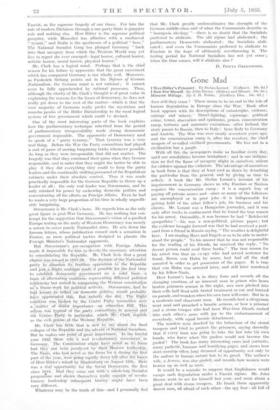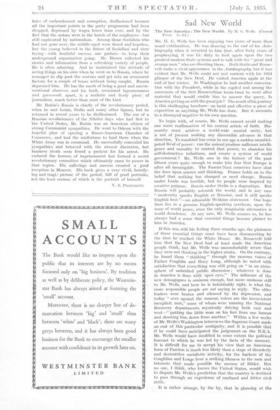Gone Mad
AND still they come ! There seems to he'd() end teIhe tale of hunian degradation in Europe' since the' War. Book after book 'appears with its deseriptions of eatastrdPhe, • violence; outrage and" Misery: 'Street-fighting; espionage, .Political crime, terror, starvation and epidemics, prison, concentration Camp, tortures- and summary execritionsafter Ireland, the story liaises to Russia,lhen to.Italy, ; from Italy-to GerinanY and Austria. The War was over nearly seventeen. years ago,' and the concentration camp is after the revolver, the 'chief weapon of so-called civiliied governMents. We live not in a
Civilization. but a jungle. • - • •
With all this the newspapers ,Make us familiar every day; 1111 it our sensibilities become brutalized ; :and in Our indigna tion we feel the flame 'of savagery alight in obiselVes; ardent for Violence against'the violators: , The' advantage of narratives in book form is that they at least cool us down, by detaching the particular frbm. the general,- and by giving us time to reflect. A book like Mr. Stefan . Lorant's iieeotint of his imprisonment in Germany shows us why Fascism or Nazism requires the concentration camp : it is a superb Way of paying off private scores and—since so many of the followers are unemployed or in poor ' jobs—it is indispensable for getting hold of the other fellow's job, his business and his clients. Mr. Lorant was a Hungarian journalist, and it was only after weeks in confinement that he found the true reason for his arrest. Ostensibly, it was because he had " Bolshevist sympathies "—his was a non-political, picture paper ; but the evidence brought forward was that he had received a post- card from a friend in Russia saying, " The weather is delightful here. I am reading Marx and Engels so as to be able to under- stand the people," To his answer that he was not responsible for the reading of his friends, he received the reply, " No decent person could read these books." The true reason for his arrest was that an ex-spy who had served sentence for fraud, Baron von Hahn by name, had had all the staff 'arrested in order to get possession of the paper. It is true that von Hahn was arrested later, and still later murdered by his fellow-Nazis.
. Herr • Lorant's book is in. diary form and records all the changing, emotions of an innocent man in prison who hearse beaten prisoners scream in the night, sees men pitched into their cells half dead with brutal treatment or cut and bruised bn parade, and wonders when his own turn will come. But he is a moderate and observant man. He records how a clergyman went mad and preached a lunatic sermon, or how a prisoner and a storm trooper who had been War-time friends rushed into each other's arms with joy to the embarrassment of everybody, with equal laconic detachment. ..
The warders were shocked'by' the behaviour of the storm" troopers and tried to protect the prisoners, saying shrewdly that if decry Mali- was ,going to take the law- into' la 'own hands, who knew When the gaolers would :not beedine the gaoled ! The book has many interesting cases and pOrtraits, many pathetiOmniane and horrifying pagbit, and r.tioivs how shirt-worship• offers long dreamed of opportunity not only to the sadism in human nature but 'to- its greed. 'The 'author's wife, a Jewess, was also gaoled, and :records hOw warier were beaten up as-Well as Men." It would be a mistake to suppose that Englishmen would escape such degradation 'under a Fascist regime. Mr. John Brown went: to see- for himself la.st.year, and. went about a great deal with storm troopers. He found :them apparently decent men, all afraid of each other—the spy fear—all full of tales of embezzlement and corruption, disillusioned because all the important points in the party programme tad been dropped, depressed by wages lower than ever, and by the fact that the unions were in the hands of the employers—but still captivated by nationalism. Among those Socialists who had not gone over, the middle-aged were dazed and hopeless, but the young believed in the future of Socialism` and Were trying—with doubtful success, one gathers—to keep their underground organization going. Mr. Brown collected his 'stories and information from a refreshing variety of people. He is often admiring. And he maintained this attitude of seeing things on his own when he went on to Russia, where he managed to slip past the sentries and get into an armament factory for a couple of hours without being caught. RuSsia depressed him. He has the merit of being a good and uncon- ventional observer, and his book, occasional ingenuousness and guesswork apart, is a realistic and lively piece of 'journalism, much better than most of the kind.
Mr. Rubin's Russia is chiefly of the revolutionary period, when he met Lenin, Stalin and many other figures, but he returned in recent years to be disillusioned. The son of a Russian revolutionary of the Nihilist days whd had fled to the United States, Mr. Rubin was an American citizen of strong Communist sympathies. He went to Odessa; with the hopeful plan of opening a Russo-American Chamber of Commerce, and had the misfortune to land there when the White Army was in command. He successfully concealed his Sympathies and behaved with the utmost discretion, but business rivals soon found a pretext for his arrest. He endured the horrors of imprisonment but formed a secret revolutionary committee which ultimately came to power in that region. His sufferings and success ensured' a good reception in Moscow. His book gives a very vivid, horrify- ing and tragic picture of the period, full of good portraits, not the least curious of which is the portrait of himself.
V. S. PRITCHETT.















































 Previous page
Previous page